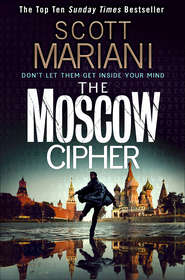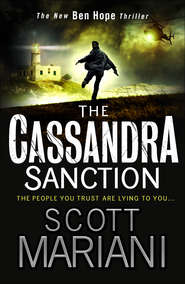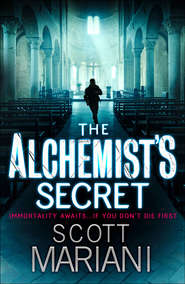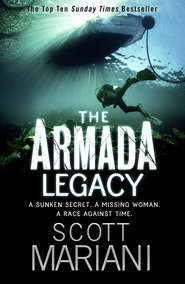По всем вопросам обращайтесь на: info@litportal.ru
(©) 2003-2024.
✖
Conspiracy Thriller 4 E-Book Bundle
Автор
Год написания книги
2019
Настройки чтения
Размер шрифта
Высота строк
Поля
Penrose glowered at him, breathing hard. A vein was popping in his forehead. His carefully coiffured hair was sprawling in all directions. After twenty long, silent seconds, he lowered the gun. ‘Pleased to hear it. I want this man dead, whoever he is. I don’t care if you have to raze half of England to the ground to get him. I just want you to get him. Nobody is going to stop me. Nobody!’
O’Neill had kept his mouth shut until now, but couldn’t hold back any longer. ‘If I could remind you, Mr Lucas, my employers have been quite clear that they want this kept as quiet as possible. I thought that was understood.’
Penrose balked in horror at his words, then turned on him. ‘Your employers also recruited me to run this operation, yes? Me, not you. That was also understood.’
A number of possible replies occurred to O’Neill. Most of them centred on the theme of ‘Yes, but the Trimble Group never realised they were taking on a raving bloody maniac’. But considering the circumstances and the Coonan .357 that was still clutched tightly in Penrose’s fist, he wisely chose not to voice them. Shortly afterwards, he left the room and returned to his own office within the villa complex while Cutter and Mills were dismissed back to their quarters to lick their wounds and await further instructions.
Penrose Lucas spent quite a few minutes pacing and seething alone. He pulled out a large holdall from under the desk, unzipped it and lifted out the stacks of banknotes he kept in there. Counting the money sometimes soothed him – but not this time, and as the migraine just kept worsening he was compelled to retreat to the bedroom to lie down.
After an hour in the blacked-out room with a mask over his face and five codeine tablets washing through his bloodstream, he emerged and turned on his computer, intent on finding out all he could about Simeon Arundel’s mysterious and peculiarly talented guest.
Thanks to Rex O’Neill and the team behind the scenes whose names and faces Penrose neither knew nor wanted to know, he had unlimited access to police reports and a host of other data, some of it official, some of it not, concerning his victims before and after their deaths. He’d scanned through them already, but as he perused the files again now he paid much more attention to detail.
‘Ben Hope,’ he said out loud. The name came up twice. Once as the witness at the scene of the fatal car crash, and again as a speaker at the musical event, a concert at the Leigh Llewellyn Foundation, which Simeon Arundel and his wife had attended – shadowed, unknown to them, by Dave Mills.
What was a man like this doing hanging around a supposedly empty vicarage in the middle of the night, and getting in the way of his carefully laid plans? Penrose had always been a keen researcher, and nothing motivated him like utter hatred. Digging a little deeper, he quickly unearthed the connection between this Ben Hope and the deceased opera star Leigh Llewellyn. The old news item announcing their marriage was still viewable online and provided Penrose with his new enemy’s full name and title: Major Benedict Hope, British Army, retired.
From there it was just a short skip to Hope’s business website. He ran something called a tactical training facility in northern France. Penrose had little idea of what a tactical training facility was, but he understood enough to know what it suggested about the kind of skills this Hope possessed. He opened the page titled ‘About the Team’ and read, then re-read, the two short paragraphs describing Hope’s background. The man’s military experience was extensive, that much was patently obvious, but the information seemed carefully pruned, as though much of his past history couldn’t be revealed. Even to someone with Penrose’s limited understanding of military matters, that in itself was revealing enough. As for the connection between Hope and Arundel, that remained a mystery.
Wasn’t bloody O’Neill meant to take care of this kind of stuff?
Penrose summoned Cutter back to his office. Minutes later the mercenary was standing at the desk, looking no less battered and sour than he had earlier, and every bit as wary. He soon understood that his boss’s psychopathic rage had settled down to a mere simmering fury, and the gun would remain in the desk this time. Cutter relaxed a little.
His eyes flicked across to the holdall and the bundles of cash that were visible through the open zipper. That looked like one hell of a lot of money in there. Cutter noticed two more holdalls just like it on an armchair at the back of the room. He remembered what the boss had said that night back in London. Money’s the easy part.
‘Is this the man you encountered in Arundel’s home?’ Penrose demanded, showing him the picture on the website.
‘That’s him,’ Cutter said instantly, with a flash of pain and humiliation.
‘You were a soldier. Can you tell more about who he is?’
Cutter studied the webpage. ‘Not your regular ex-squaddie. This guy’s been in deep.’
‘The question is, can we deal with him?’
‘We can deal with him. We were just unlucky. He had the element of surprise, that’s all.’
Penrose nodded thoughtfully. ‘Did you say the rest of the team were still in position?’
‘Vince Napier’s just waiting for my call.’
‘Then make it,’ Penrose commanded.
Chapter Twenty-Three
Ben headed west on the motorway with the dog perched on the passenger seat beside him. After three hours of fast driving he left the M5 at Exeter to cut across the bleak, rugged landscape of Dartmoor National Park. He still didn’t know exactly where he was going. As he drove, he called Jude four, five, six more times. Still no response. Evidently, not all of the younger generation were surgically attached to their mobile phones.
The weather was closing in as the afternoon wore on. Dark rolling clouds scudded menacingly over the craggy landscape, and a freezing mist was descending. The roads were getting narrower now, and almost deserted. This was one of England’s last real wildernesses, and the place he was looking for could be just about anywhere. The sense of frustration was slowly rising as he neared Bodmin.
Suddenly feeling the buzz of the phone in his pocket, he made a grab to answer it. ‘Jude, is that you?’ He’d left him so many messages that he felt he knew the kid.
‘This is Sophie Norrington,’ said a clipped-sounding female voice.
There was hardly any mobile signal up here, and Ben was worried about getting cut off. He thanked her for calling back, explaining again that he was a friend of the Arundel family.
‘Mum told me what’s happened. It’s awful. Poor Jude!’
‘He doesn’t know yet,’ Ben said. ‘I’m travelling to the farm in Cornwall to tell him.’
‘That dump,’ Sophie sniffed. Like mother, like daughter.
‘Your mother told me you’d been there,’ Ben said. ‘Can you give me directions?’
‘It’s really isolated. I think the nearest village was called War … War-something. Warleg. Warlego.’ Sophie’s voice kept breaking up, and he had to strain to make out her words. He pulled the car over to the side of the road, flipped on the inside light and began scouring the map he’d bought at the last fuel stop. ‘There’s a place here called Warleggan.’
‘That’s it.’
‘What about the name of the farm itself?’ he asked quickly, anxious that he was going to lose the phone signal at any moment.
Sophie thought for a moment. ‘It was something suitably grim and lugubrious-sounding like “Bleak Mountain”. No, that’s not it. Black Rock. Black Rock Farm. Ask any of the locals. They’ll tell you how to find it, but you might get some funny looks.’ She paused, then said in a softer tone, ‘Will you tell Jude I asked after him?’
‘I’ll do that,’ Ben said. He was about to thank her when he realised the phone signal had died on him.
As they’d been speaking, Ben had been looking in the rear-view mirror at the lights of the car behind. Near as he could tell, it was a Range Rover Sport, dark blue or black. It had been there with him for a few miles, holding steady at the same pace as the Mazda. Now it was pulled in at the side of the road a hundred or so yards behind, as if waiting for him to drive on so it could follow. In the dimming light Ben could make out nothing of its occupants. The mist swirled like gunsmoke in the beams of its headlights.
Scruffy growled.
‘I was thinking the same,’ Ben said. He watched the Range Rover a moment longer, then put the Mazda back into gear and pulled away sharply with a rasp of tyres.
Close up ahead was a narrow lane cutting away perpendicular to the road. He waited until the last moment and then threw the Mazda into it, skidding on the loose surface and accelerating away hard.
The Range Rover didn’t follow. I must be imagining things, Ben thought to himself, and as more miles passed and dusk fell to night, he became convinced of it. The only other light that appeared in his rear-view mirror was that of a solitary motorcyclist who followed him for a while along the winding moor roads and lanes, then shot past in a blast of twin exhausts on the approach to the tiny, remote village of Warleggan. Ben caught a glimpse of the pillion passenger holding on tightly to the grab-rails on the bike’s tail; then it was gone in the mist.
As Ben drove through the village he saw the lights of a pub and pulled up outside, climbed out of the car and went in. The place was filled with locals, warm and noisy with chatter. He got the usual sideways glances from a few of the locals taking notice of a stranger as he walked up to the bar, perched on a stool and bought a double of malt scotch. As he sipped it, the barman, a thick-chested man who resembled an old-time sailor with his beard and gold earring, asked him cheerfully if he was on holiday.
‘Not exactly,’ Ben said. ‘I’m looking for Black Rock Farm.’
‘It’s all hippies up there,’ the barman muttered after a pause, his cheerful demeanour instantly evaporated. In just a couple of words, the welcome stranger had morphed into a drug dealer, or worse. ‘Got business there, have you, sir?’ the barman asked, eyeing Ben sternly as he reached out for a glass to polish.
‘Of a kind,’ Ben said, meeting his eye but keeping the smile on his face. ‘And I’d be grateful for directions, if you know how to get there.’
Outside in the misty street, the leather-clad rider sat astride his motorcycle and blipped the throttle. He had his visor up and was leaning across the bike’s fuel tank to speak quietly to the driver of the gleaming black Range Rover Sport that had pulled up beside him and rolled down its window. The driver’s face was long and lean. The hem of his beanie hat covered the scar over his eye.
There were five other men inside the car, and they were all gazing in the direction of the pub and the Mazda Roadster parked outside it. So was the bike’s pillion passenger, his face hidden behind his helmet’s opaque visor.
The scruffy-looking mongrel inside the Mazda had jumped up on the passenger seat and had his nose pressed to the window, staring intently back at the watchers. The dog bared his fangs and let out a long, low snarl.
A few more words passed between the driver and the motorcyclist; then the motorcyclist nodded, lowered his visor, nudged his bike into gear and rode off. The Range Rover purred slowly on past the pub. The driver reached for a mobile phone.











